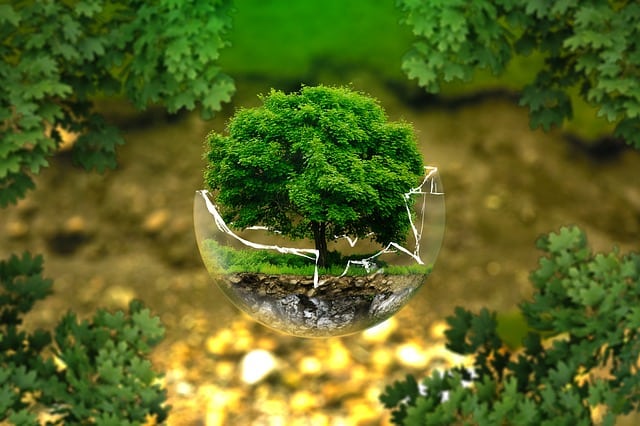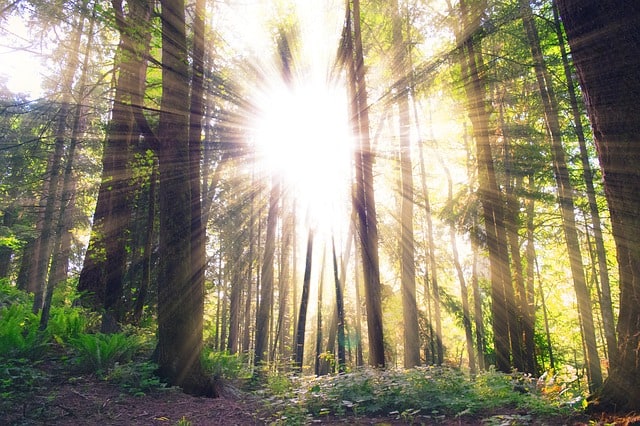These days, pollution, global warming and dwindling resources are a big concern. Many people feel hopeless, as though nothing they do will have any effect on a problem that’s grown so large. However, there are lots of things that people can do every day to cut down on their negative impact on the environment. Although some of these things are big things involving home construction or choice of motor vehicle, most of them are small things that can make a huge difference if you remember to do them every day.
Out of all those millions and millions of planets floating around there in space, this is our planet, this is our little one, so we just got to be aware of it and take care of it.
~ Paul McCartney
Here are 36 impressive ways to make this planet Earth friendly.
1. Get Exercise on Your Commute
Rather than hopping in your car, if you live close enough, why not save gas and bike or walk to work?
2. Use Public Transportation
From subways to light rails and buses, if you live in a busy, urban area, there are plenty of public transportation options that can save you fuel and money (as well as help save the environment).
3. Live Where You Work
If you’re in the market for a house or apartment, consider moving closer to where you work. If this isn’t a possibility, talk to your boss to see if you can work remote at least a few days out of each week.
4. Change Your Ride
If you live far from your job and public transit isn’t an option, consider purchasing an electric or hybrid vehicle. If either of those is out of the question, purchase a vehicle that’s the smallest and most fuel-efficient possible.
5. Pick Up Your Neighbors (or Catch a Ride)
If you must commute, carpool. Think of all the extra cars that would be taken off of the road each day if more people shared rides!
6. Not So Fast!
For better gas mileage, slow down a bit while driving. Speeding not only puts you and others on the road in danger; it consumes more miles per gallon.
7. Don’t Dump That Motor Oil!
If you change the oil in your car, find a plastic container that’s clean and pour the old oil in it. Locate an oil recycling center in your area for proper disposal.
8. Light Your Home Responsibly
These days, there’s no reason not to use energy-efficient lights at home. New energy-efficient bulb technology means that you can find bulbs with a diversity of colors and functions in order to save electricity and money.
9. Consider Your Appliances, Too
New energy-efficient appliances are everywhere. From dishwashers and washing machines that use less water to refrigerators that use less electricity, these appliances save energy without sacrificing function, making them a no-brainer for environmentally-conscious people.
10. Update Your Windows
Just like the insulation in your house, your windows can do a great job of keeping temperatures inside just where you want them. If you have windows that are old, they probably aren’t up to modern standards of energy efficiency.
11. Make Your Home Cozy
Proper home insulation can help keep you toasty during the cold winter months. It can also help trap air conditioning (and keep heat out) during the searingly hot summer season. Both of these will save you a ton of electricity.
12. Take Care of Plumbing Repairs
To save water, don’t wait to repair a plumbing fixture or faucet that’s leaking or dripping water. Those drips build up to a large amount of wasted water.
13. Consider Xeriscaping
Everyone wants a huge, green lawn, but those lawns take a lot of water to keep them alive and healthy. Many homeowners are turning to xeriscaping, a kind of landscaping that uses little to no water to keep it looking gorgeous.
14. Turn Off Water While Brushing Your Teeth…
Several gallons of unused water rush down the drain if you leave the faucet running while you brush your teeth. Turn it off, scrub-a-dub, then turn it back on to rinse.
15. …And While Shampooing Your Hair
The same goes for shampooing. If you’ve stepped out of the water in order to lather up, turn the water off as you do so.
16. Cut Down on Shower Time
It feels great to stand in the shower until you feel reborn, but it wastes a lot of water. Take shorter showers in order to save water.
17. Invest in Low Flow Toilets
These new toilets help you get the job done without wasting excess water. Some of them even have two flush options, with less water for smaller flushes and a bit more water for larger ones.
18. Wash a Full Load
Never start your washing machine or dishwasher until you have a full load of clothing or dishes. This way, you’ll run less cycles (and use less water).
19. Harness the Power of the Sun
If possible, install solar panels on your house. They’ll save you money on your electricity bill and be a huge help to the environment.
20. Recycle, recycle, recycle
Don’t simply toss everything in the trash; take a minute to consider if the item you’re throwing away can be recycled. If your neighborhood doesn’t offer curbside recycling, separate your plastic, glass, cans and paper and find out where your nearest recycling center is.
21. If You Can’t Use It, Someone Else Can
Donate gently-used, unneeded items to local charities so that others can use them instead of having to purchase them brand new.
22. Organize a Book/Clothes Swap
Call up your friends, family, and neighbors and put together an event to swap clothes, toys, and books that you no longer need for ones that are new-to-you.
23. Purchase Reusable Shopping Bags
Paper and plastic bags are free when you shop, but they’re also killing animals and destroying our environment. Scientists have found that sea turtles often encounter plastic bags in ocean waters and eat them, mistaking them for jellyfish. Refuse paper or plastic and make an investment in your own reusable bags, instead.
24. Drink Holders Are Nature Hazards
Those plastic, six-ring drink holders are everywhere—and they sure are handy—but they’re a danger to wildlife that can get stuck in them. The next time you finish a six-pack of drinks, take time to snip the plastic holder apart before you throw it in the trash. You could save an animal’s life.
25. Learn About Your Local Zoo
Many zoos take excellent care of their animals and work to breed and increase the numbers of endangered animals. Those zoos deserve our patronage and support.
26. Grow Your Own Vegetables/Herbs
The growing and shipping of products creates a lot of waste and is hard on the environment. More and more people are starting gardens in their back yards or even on patios and balconies. This is a great way to have fresh, pesticide-free fruits and veggies available right outside your back door!
27. Support Local Farmer’s Markets
Don’t have the time or space to grow your own? Go shopping at your local farmer’s market. This is a great way to support your community and small farms. It also cuts down on emissions created when produce is shipped cross-country from long distances.
28. Turn It Off!
When you leave a room, turn off the lights! The same goes for televisions and anything that uses electricity. If you’re not around to use it, switch it off!
29. No More K-Cups
Even the creator of K-cups said that he regretted all of the waste that was being generated by the convenient little coffee pods. If you have a Keurig machine, though—don’t despair! There are reusable K-cups available that you can fill with any ground coffee of your choice.
30. Vote for the Environment
Our elected representatives make policies that greatly affect the environment. Before voting, research what candidates’ views are (as well as their voting histories) on various environmental issues.
31. Try Meatless Mondays
Even the most ravenous carnivores among us can manage one day a week without meat. The production of meat is a big contributor to air and water pollution and climate change overall. If everyone took one day off of meat-eating, this would help greatly reduce emissions and pollution.
32. Keep Track of Food You Throw Out
We all buy veggies with good intentions and then send them to die in the drawer at the bottom of the fridge. Start keeping track of food that ends up being wasted in order to shop smarter and stop purchasing (or start using) those foods.
33. Put Perishables Where You Can See Them
Expanding on the above tip, don’t put fruits and veggies in the bottom-drawer-of-no-return. Put them in the center of the top shelf. If you can see them, you’re more likely to use them instead of waste them!
34. E-Cycle
Old computers, cell phones, and other electronic devices are horrible items to end up in landfills, leaching chemicals and toxins from metals and old, dead batteries. These items can all be recycled; check to find where in your area you can drop things for e-cycling.
35. Volunteer in Your Community
Get involved in efforts to clean up and beautify green spaces in your town or city. This will help other people appreciate these dwindling resources.
36. Get Outside
The best way to appreciate the environment is to be more aware of it. These days, many of us spend all of our time sitting indoors. Get up and get outside, whether that means walking, biking, kayaking, or some other fun outdoor activity.







